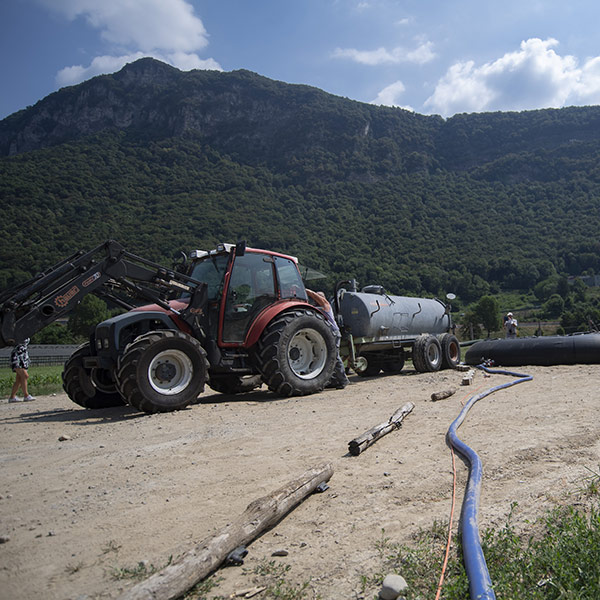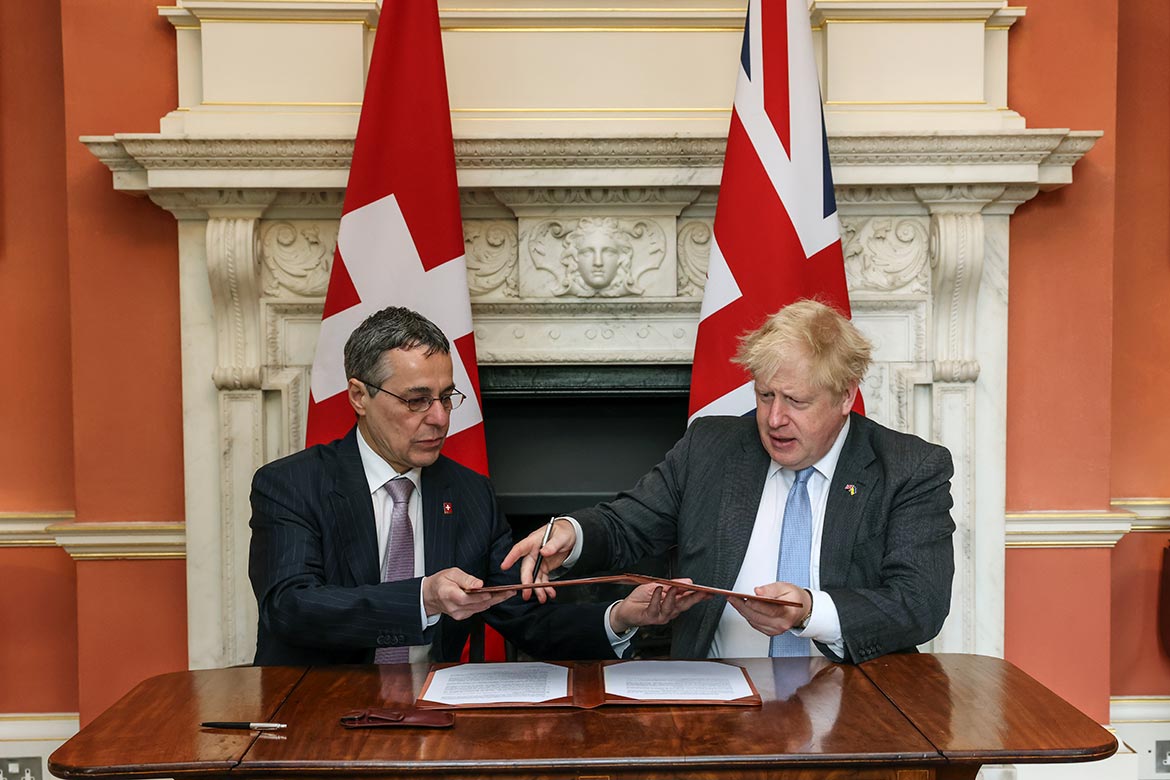Feature: Water bargaining
“Disputes over water inevitably end in compromise”
Water is the elixir of life. When it becomes scarce, suffering and conflict are often not far away. But this doesn’t escalate into war, says Thomas Bernauer. He’s a political scientist, and for years now he’s been analysing how countries argue over water resources – and how they usually manage to reach a compromise.

Thomas Bernauer is a political scientist who maintains that ‘water wars’ are a myth. Researchers agree, he says, that water doesn’t cause major conflicts. | Photo: Paolo Dutto/13Photo
War has been raging in the Gaza Strip for almost a year. There have been repeated claims that Israel is using water as a weapon. Is water a cause of war, here and in other areas of conflict?
There are two issues here. The first is whether an armed conflict is triggered by the distribution of water resources, in other words, whether water is the prime cause. Here, research is pretty clear that the answer is no. The idea of ‘water wars’ is a myth. The second touches on the role that water resources play in armed conflicts that have arisen for very different reasons. And here, the answer is that they can indeed play a role. For example, Russia has destroyed a large dam in Ukraine that is important for its water supply. There were strategic military considerations behind this act of destruction. Russia wants to inflict economic damage on Ukraine, and by causing flooding it makes it more difficult for Ukraine to embark on a counterattack. In Gaza, the Israeli military is turning off the water supply in order to intensify the suffering of the local population. This is also a means of warfare. But in both cases, water is not the cause of conflict.
But back in 1985, the then General Secretary of the UN Boutros Ghali said: “The next war in the Middle East will be fought over water, not politics”.
That prediction was wrong. There’ve been several armed conflicts in the region since 1985: in Iraq, Syria and now Gaza. And there’s practically a permanent, low-threshold war ongoing in Lebanon. But none of these wars is really about water. Perhaps Boutros Ghali was thinking more of his home country of Egypt when he said that. Many have suggested that if there is ever a war over water distribution, it will be over the Nile.
What’s that about?
Ninety-seven percent of Egypt’s surface water comes from outside the country – that’s more than for almost any other nation in the world. In these circumstances, it’s obvious that when another country builds large water infrastructure in the upper reaches of the Nile, it’s going to create a very delicate situation. This is exactly what Ethiopia has done with its Great Renaissance Dam. But no war has broken out there either.
So why doesn’t water trigger open conflict?
The most plausible answer is that there are all kinds of opportunities for compromise when it comes to utilising these resources. People always find solutions on a technical or political level. For example, a reservoir in the upper reaches of the river might be filled more slowly, meaning that more water remains for the countries in the river’s lower reaches.
Have Egypt and Ethiopia been able to reach an agreement on it?
Egypt hasn’t yet concluded any formal agreement with Ethiopia, but negotiations have been going on for a long time and agreements have been made on an informal basis. In any case, Ethiopia is filling its reservoir slower than it actually could, and it’s operating the dam in a way that means Sudan and Egypt are still getting enough water.
What are the deciding factors that make dialogue possible for countries competing over water?
The problem has to cause a lot of pressure, relatively speaking, and the countries that are suffering the most have to be able to stand up pretty convincingly to the perpetrators, both economically and politically. The general condition of interstate relations also plays an important role. For example, the countries bordering the Rhine haven’t gone to war against each other for over 70 years. But the Nile, like the Euphrates and the Tigris, flows through countries whose relationship to each other is extremely poor. There’s often talk of ‘water diplomacy’, as if water were a kind of technical object that has little to do with politics. This is where States can practise cooperating. But my observations suggest that water diplomacy has hardly ever made any contribution to resolving overarching conflicts.
How can we measure the success of negotiations around water problems?
You can compare the targets set by the States with the situation on the ground in terms of water quality or discharge volume, for example. But you can also measure success by the degree of satisfaction demonstrated by the various stakeholders with the outcome of their negotiations. After all, a compromise is a situation in which nobody is completely happy, but which is acceptable to everyone. In my opinion, one criterion for success is when all the shouts and threats have stopped and everyone can live with the situation they’ve reached.
Can you name a historical example where a solution was found to a water conflict?
There are lots, as it happens. For example, the Syr Darya is a large feeder river of the Aral Sea that used to lie entirely within the Soviet Union. When the country collapsed, it became an international body of water. Kyrgyzstan then came into possession of a large dam near its border with Uzbekistan that is extremely important both for Kyrgyzstan’s energy supply and for water supplies in Uzbekistan. In 1991, Kyrgyzstan changed how it operated the dam so that it could produce more electricity in winter. But that had a detrimental impact on agriculture in Uzbekistan, which made vehement protests and even threats. But there’s since been a series of agreements both formal and informal that have brought this conflict pretty well under control.
In Europe, water conflicts usually take place within a single country – as with the strawberry fields in Spain. Can we observe the same mechanisms for conflict resolution in these cases?
Generally speaking, you can say that conflicts like these are easier to resolve as long as the State is functioning reasonably well. On an international level, horizontal solutions have to be sought, where the partners involved are equal before the law. But this often produces solutions based on the lowest common denominator. Within a single country, however, the entire state apparatus plays a role. Many water conflicts are taken to court or resolved through legislation. For example, if the Swiss Parliament passes a new water protection law, it’s irrelevant if an individual canton or city doesn’t approve of it. Everyone has to abide by it.
In Europe, the Rhine has repeatedly been a source of conflict.
Problems with the Rhine have mostly been about pollution from industrial and domestic wastewater. The main victims were the Dutch, who also kept protesting about it. Today, the Rhine is doing pretty well. In 1950, the International Commission for the Protection of the Rhine was formed by all the countries bordering the river, and it led to many agreements being concluded. But the really significant improvements in water quality were a result of national regulation, sewage treatment plants, phosphate bans and so on. Today, concern about the Rhine is increasingly focussed on its ecosystem. But this is perhaps also something of a luxury, for you can only concentrate on biodiversity and Nature conservation once you’ve got the worst pollution under control.
Can I ask you for a prediction: where will water conflicts break out in the coming years, and which conflicts will be resolved?
I still believe it’s highly unlikely that we’ll see major international wars over water. But local, intra-state conflicts over water distribution are regrettably going to increase. Many countries are suffering more and more from climate change, while rainfall is becoming more irregular in distribution and is also getting more difficult to predict. This means that there are going to be more periods when we have too much water, but also more droughts. If the pie becomes smaller, so to speak, or less predictable in size as the population grows, then conflict is inevitable. But it’s likely that any escalation into violence will remain limited to very poor countries and to those that are politically, socially and economically unstable.
Why is that?
Countries need well-functioning infrastructure and institutions. Rich democracies have the best prerequisites for this, whereas it’s much more difficult for many countries in the Global South where public institutions such as administrative bodies and courts often function poorly. What’s more, those countries have little money to build or maintain new infrastructure along the lines of reservoirs or irrigation systems. Wealth is also distributed very unequally there, and this is also reflected in people’s access to water.




